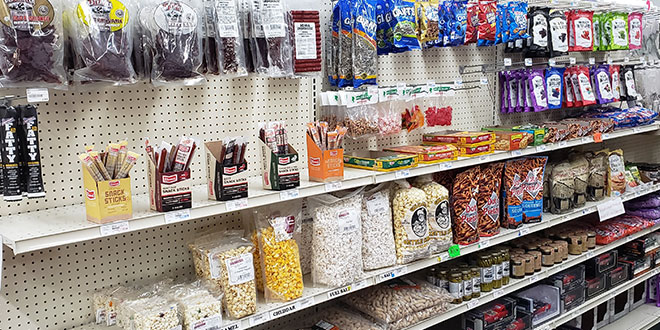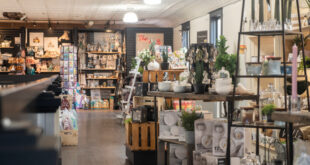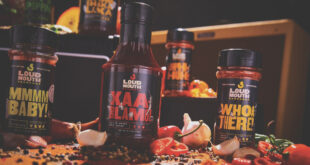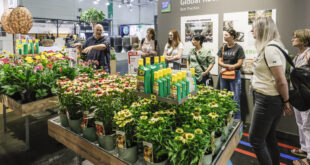The National Confectioners Association recently reported that plant-based snacks like popcorn, chips, veggie straws, corn crackers, dairy-free snacks, grain-free snacks made from plants like butternut squash or cauliflower, vegan puffs, minimally processed snack bars with limited ingredients and specialty diet snacks are growing in popularity.
While food trends can inform the choices you make when selecting consumables to bring into your operation, following fads shouldn’t necessarily be the priority in this category.
Treat your consumables category like you would any other niche opportunity in your business. Talk to your customers and employees about what appeals to them when it comes to snacks and treats and what makes them put something in their basket. Through these conversations, you may find ample opportunities to try something different that could be your next big hit.
On the following pages, learn how focusing on new products and bringing in locally made and packaged food items can boost add-on sales and customer loyalty.
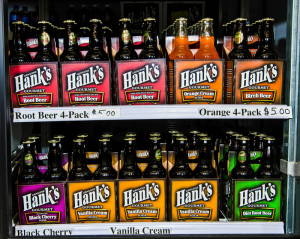
‘Keep It Fresh’
Mills Hardware & Feed in Arnold, Nebraska, has seen increased interest in healthy snacking. The store has more than 24 feet of floor space dedicated to consumables. Though the category only accounts for 4 percent of the business’s overall sales, it promises steady sales.
“Some people prefer healthier snacks like granola bars,” says store manager Andrew Tickle. “But those items are more of a fad and the sales drop off after a while.” Mills Hardware & Feed has carried food items since it opened in 1996, sourcing new items twice a year at its distributor markets.
“You’ve got to keep it fresh—people like either the staples or something new,” Tickle says. “You can’t just go with average shelf fillers.”
At Mills Hardware & Feed, food items generally make great add-on sales. Meat jerkies and beef sticks are Tickle’s most consistent sellers, with fans of those items purchasing them nearly every time they are in the store. Craft sodas are also strong sellers.
In addition to finding new consumables at distributor markets, the Mills team finds them at other home improvement businesses.
“When we travel, we always visit hardware stores and see what they have,” says Tickle. “We want to make sure we’re keeping up with the times.”
Trying new food items is an experiment with some risk because most edibles have expiration dates.
 Local Food Sales
Local Food Sales
By the Numbers
53% of survey respondents seek out locally grown or locally produced foods
Almost half are willing to pay up to 10% more; one-third are willing to pay up to 25% more
A third of consumers also claim to consciously purchase locally grown or locally produced foods at least once a week.
Source: 2014 National Consumer Survey, Packaged Facts
“We bring it in and try it,” Tickle says. “If it’s not selling, we move it to an endcap or run a sale before it’s out of date.”
Tickle says it’s important to be aware that food items, unlike most other home improvement product lines, are time-sensitive commodities.
“Someone needs to be in charge of checking the dating and fronting in this category,” he says. “The old needs to be moved to the front and the new to the back when stocking.”
Expiration dates aren’t the only challenges with consumable items this year. During the COVID-19 pandemic, Mills Hardware & Feed store traffic has been steady and add-on sales from the convenience of food items have been strong, but sourcing has been a challenge.
“We’ve had to be willing to accept products that may not be the exact SKUs we want because something on the shelf is better than empty shelves,” he says.
Tickle has had fewer issues stocking local items since he deals with the manufacturers directly. A steady supply of local food is important at Mills Hardware & Feed because many local products drive shoppers to the store, making the goods more valuable than just add-on items.
“We have a handful of products that are unique and draw people in,” says Tickle. “We carry a pancake mix that people prefer to the standard mixes they get at the grocery store. It comes in different flavors.”
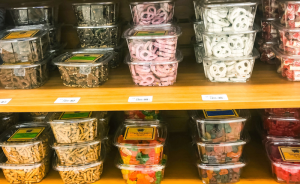
Local Is Best
Because independent hardware stores are local themselves, there is an advantage to selling locally sourced products. The local food movement has gained ground, especially in recent months as consumers have wanted to limit trips to grocery stores.
In Nebraska at Mills Hardware & Feed, locally made popcorn balls and cakes are its best-sellers. Tickle calls the supplier one a week and picks up his order himself.
For other local items, Tickle has orders shipped. He learns about new local items when he or another member of his team sees them in other local shops. He then calls the manufacturer and asks if they are interested in becoming a Mills Hardware & Feed vendor.
“You never know if you can access something unless you ask,” Tickle says.
At Keim Lumber, a family-owned destination store with a cafe and catalog company that was founded in 1911 in Charm, Ohio, local food manufacturers often come to them, saving Keim Lumber buyers the trouble of sourcing new options.
“You never know if you can have access to something unless you ask.”
“We discover new local products when vendors bring them in and ask if we want to sell it,” says lawn and garden department manager and buyer Levi Miller. “They come to us first, before they go anywhere else, because we’re one of the largest stores in the area.”
Miller added candy and snacks 15 years ago when the company decided to grow its consumables category beyond vending machines. Now the company has three endcaps with snack items at the registers along with a selection of nuts and candy. Keim Lumber carries over 40 SKUs of a local food brand that specializes in chocolate candies, including peanut butter cups and nut mixes.
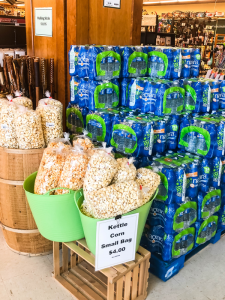 The store also sells 10 SKUs of ethically sourced coffee, which Miller says he consciously switched to because of the company’s practices. He recently moved the coffee closer to the register and sales have increased.
The store also sells 10 SKUs of ethically sourced coffee, which Miller says he consciously switched to because of the company’s practices. He recently moved the coffee closer to the register and sales have increased.
Miller adds new items to the food lineup once or twice a year. However, they order new items in the soda category every three months because the company adds and withdraws flavors often and the same SKUs aren’t always available. When Keim Lumber adds new items, the buyers and managers discuss what they think will work for their customers, says Miller. Sometimes employees on the floor also share what they think customers will like.
Locally sourced popcorn is the No. 1 food seller at Keim Lumber, and they have a key connection to the source.
“An employee is a local kettle corn manufacturer,” Miller says. “He makes it once a week and brings it in.”
Consumables represent a small but steady revenue source for Keim Lumber and Mills Hardware & Feed. Follow their example and explore flavorful options from local vendors, ensure product freshness and take advantage of special events and seasonal promotions to boost sales in the category.
 Hardware Retailing The Industry's Source for Insights and Information
Hardware Retailing The Industry's Source for Insights and Information



